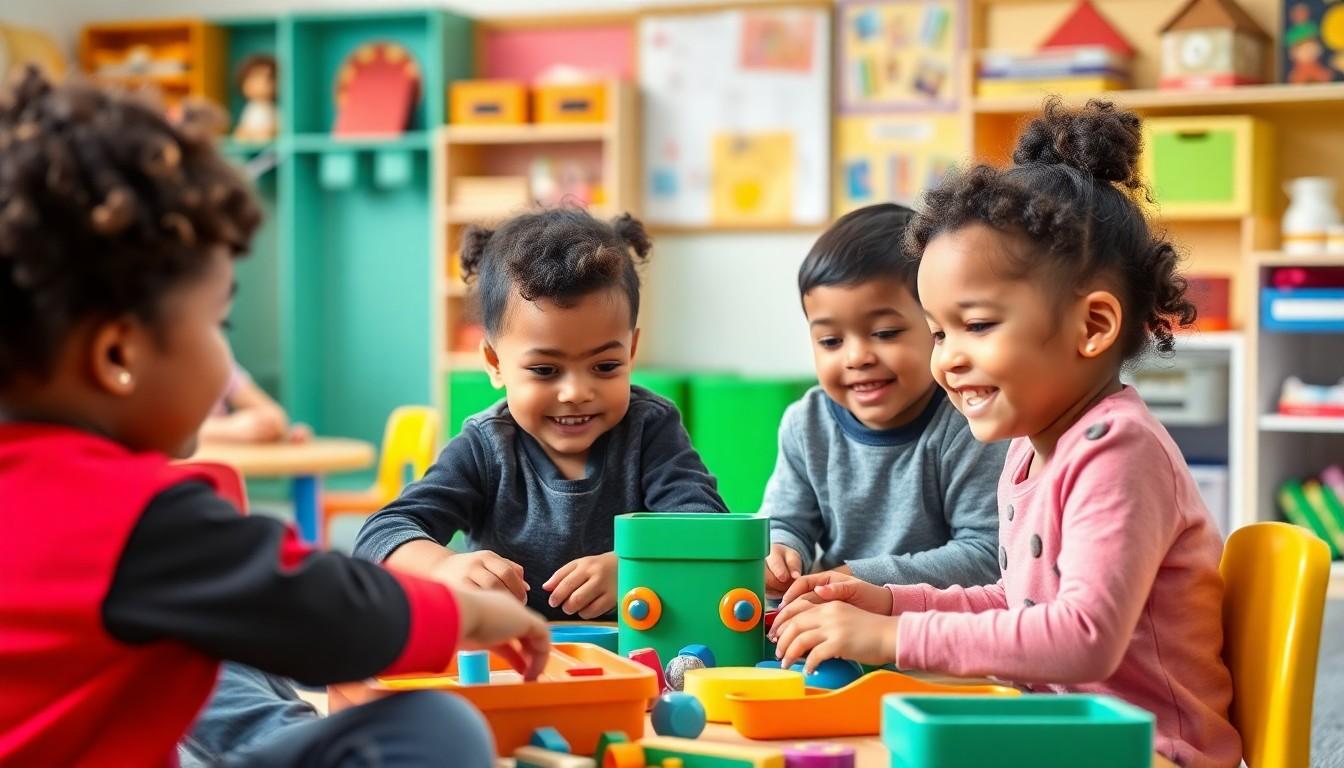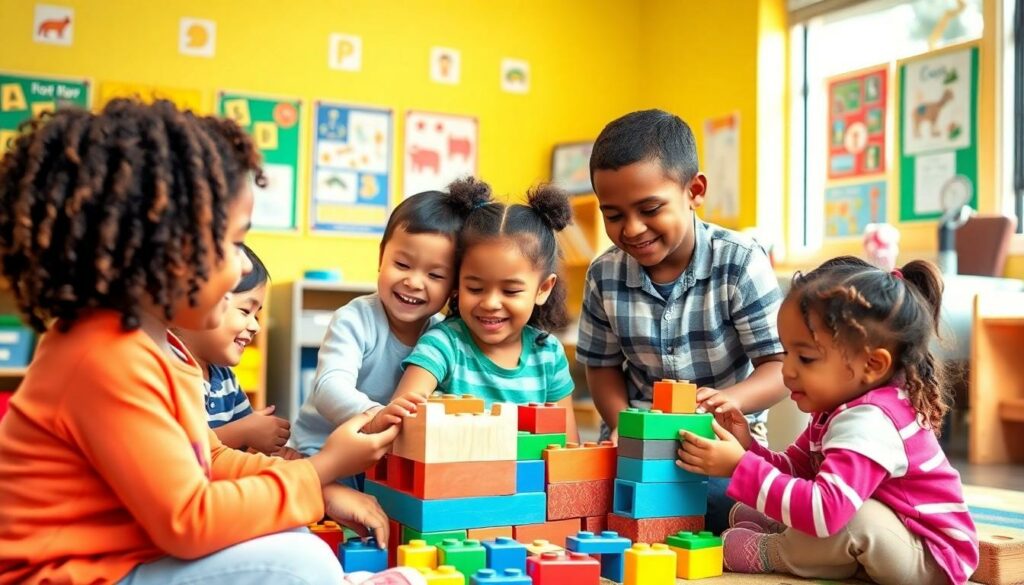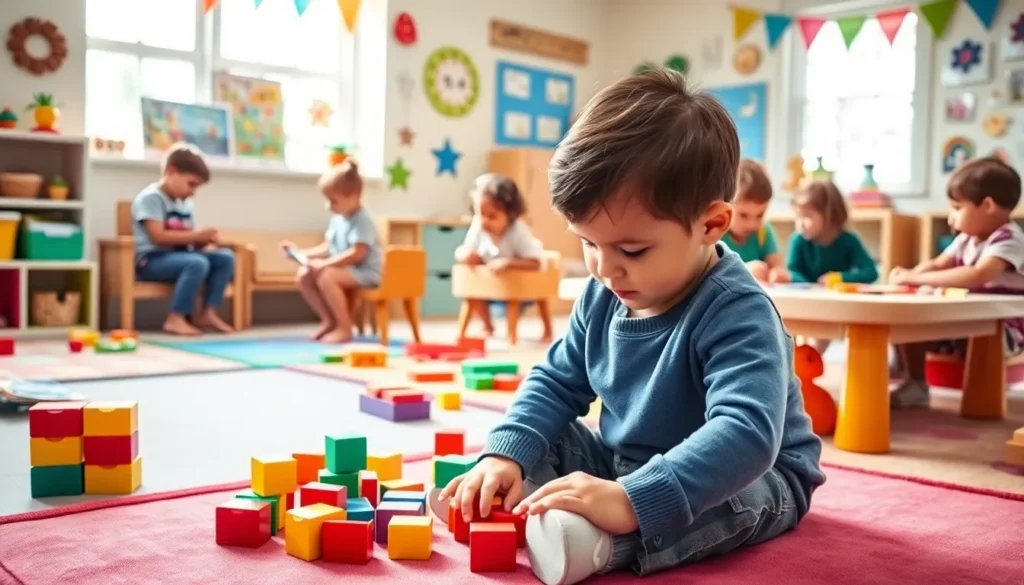In the bustling city of Chicago, where deep-dish pizza reigns supreme and the skyline steals the show, there’s another treasure worth exploring: early learning. It’s not just about ABCs and 123s; it’s about laying the foundation for lifelong success. Parents know that investing in their child’s education early can pay off big time—like finding an extra slice of pizza at the bottom of the box.
Table of Contents
ToggleOverview of Chicago Early Learning
Chicago Early Learning encompasses a range of programs aimed at enhancing children’s foundational skills. Programs focus on cognitive, social, and emotional development. State-funded initiatives like Preschool for All aim to ensure access for all children aged three to five.
The Chicago Public Schools system offers various early childhood education options, including Head Start and community-based programs. Data from the Illinois State Board of Education shows a rise in enrollment numbers, indicating increased recognition of early educational impact.
Families often benefit from resources like home visits and workshops. Support systems facilitate parental engagement and provide tools for fostering learning at home. Through partnerships with local organizations, Chicago Early Learning improves community education standards.
Access to quality education in early childhood sets the foundation for lifelong learning. In 2022, approximately 60% of eligible children enrolled in early learning programs, reflecting a commitment to educational equity. Research consistently shows that early learning correlates with better academic performance later in life.
Furthermore, educators receive specialized training to meet diverse child needs. Professional development ensures that staff utilize effective teaching strategies. Continuous assessments monitor progress and adapt programs as required.
Chicago Early Learning illustrates the city’s dedication to investing in future generations. The collaborative efforts of schools, families, and communities emphasize the importance of early intervention. This integrated approach creates a nurturing environment that fosters growth and success for every child.
Key Programs and Initiatives

Chicago Early Learning features several key programs and initiatives focused on enhancing early education. These efforts ensure children develop essential skills vital for their growth.
Preschool for All
Preschool for All serves as a state-funded program, providing access to early education for children aged three to five. The initiative aims to close educational gaps and supports families from diverse backgrounds. Approximately 20,000 children enrolled in 2022, showcasing a strong commitment to increasing accessibility. This program emphasizes play-based learning, which fosters cognitive, social, and emotional development. Additionally, funding allocations support curriculum enhancements and resources for educators, ensuring high-quality experiences for every child.
Early Childhood Education Partnerships
Early childhood education partnerships play a critical role in strengthening Chicago’s educational landscape. Collaborations involve local organizations that enrich classroom experiences and provide additional resources. Programs like community-based learning initiatives offer families essential tools, workshops, and support services. Nearly 60% of eligible children participated in these partnerships in 2022, reflecting a robust engagement from families. Together, these efforts cultivate a cohesive approach to early learning, ultimately enhancing educational outcomes across the city.
Impact on Child Development
Early learning in Chicago significantly influences child development, shaping academic, social, and emotional skills critical for lifelong success.
Academic Outcomes
Research highlights improved academic performance linked to early learning experiences. Children enrolled in Chicago’s early childhood programs often exhibit enhanced reading and math abilities by third grade. An impressive 20,000 children participated in Preschool for All in 2022, showcasing the program’s success in promoting literacy and numeracy. Engaging in play-based learning allows children to explore concepts actively, nurturing curiosity and critical thinking. Educators focus on individualized instruction, catering to diverse learning styles and experiences. These targeted efforts contribute to closing achievement gaps, setting a solid foundation for continued educational success.
Social and Emotional Growth
Social and emotional development flourishes through Chicago’s early learning programs. Children learn important skills such as cooperation, empathy, and problem-solving during interactions with peers. Participation in structured activities fosters resilience and boosts self-confidence. Approximately 60% of eligible children engaged with community partnerships in 2022, emphasizing the importance of collaborative support in building social networks. Workshops and home visits provide families with tools to enhance these skills at home, further reinforcing the child’s development. Through nurturing environments, children express their feelings and build healthy relationships, essential for future interactions.
Community Involvement
Community involvement plays a crucial role in enhancing early learning initiatives in Chicago. Strong engagement from parents and local organizations fosters a supportive environment for children.
Parent Engagement
Parent engagement significantly impacts children’s educational experiences. Workshops provide parents with techniques to support learning at home, while home visits enhance relationships between educators and families. Effective communication between parents and teachers strengthens children’s development. Data shows that increased parental involvement correlates with improved academic outcomes. Families participating in school activities contribute to a sense of belonging within the community. Programs that prioritize parent engagement lead to higher enrollment in early childhood education.
Local Organizations and Support
Local organizations contribute valuable resources to early learning programs. Partnerships with community groups enhance classroom experiences and address diverse needs. For instance, organizations offer enrichment activities, ensuring children receive holistic support. Approximately 60% of eligible children accessed resources through these partnerships in 2022. Collaborative efforts strengthen the educational framework by broadening resource availability. Local entities provide expertise and mentorship, creating networks that facilitate comprehensive support for families and children. Enhanced access to quality programs ultimately benefits the entire community.
Challenges and Opportunities
Chicago’s early learning programs face various challenges while also presenting numerous opportunities for improvement and growth. Budget constraints often hinder the expansion of access to quality education, affecting the sustainability of programs. Low funding can limit the number of children enrolled, increasing the pressure on educators and resources.
Enrollment disparities exist based on socioeconomic factors. Children from lower-income families frequently encounter barriers that prevent them from attending these essential programs. Addressing these disparities becomes crucial in ensuring equitable access to early education for all.
On the other hand, community partnerships stand out as a significant opportunity. Collaborations among local organizations and schools enhance the educational experience. Nearly 60% of eligible children accessed resources through community partnerships in 2022, showcasing the power of collective efforts in supporting early learning.
Family engagement plays a vital role in children’s success. Workshops and home visits empower parents to actively participate in their children’s education. Increased parental involvement typically correlates with improved academic outcomes, reinforcing the need for ongoing support.
Furthermore, the rise of technology in the classroom presents additional avenues for engagement. Innovative digital resources can enrich learning experiences, making education more accessible. Integrating technology can provide tailored learning experiences that address individual needs and preferences.
Effective communication among educators, families, and community members remains essential. Open dialogue fosters collaboration, ensuring that everyone involved shares a common understanding of goals. This cooperative spirit enhances the overall impact of early learning initiatives, creating a brighter future for children in Chicago.
Chicago Early Learning stands as a testament to the city’s commitment to nurturing its youngest citizens. By prioritizing early education and fostering community involvement, it creates a robust foundation for lifelong success. The collaborative efforts between schools, families, and local organizations ensure that children receive the support they need to thrive.
As these programs continue to evolve, addressing challenges and enhancing accessibility remains crucial. With a focus on equity and engagement, Chicago is paving the way for a brighter future for all children, empowering them to reach their full potential. The investment in early learning not only benefits individual children but also strengthens the community as a whole.




